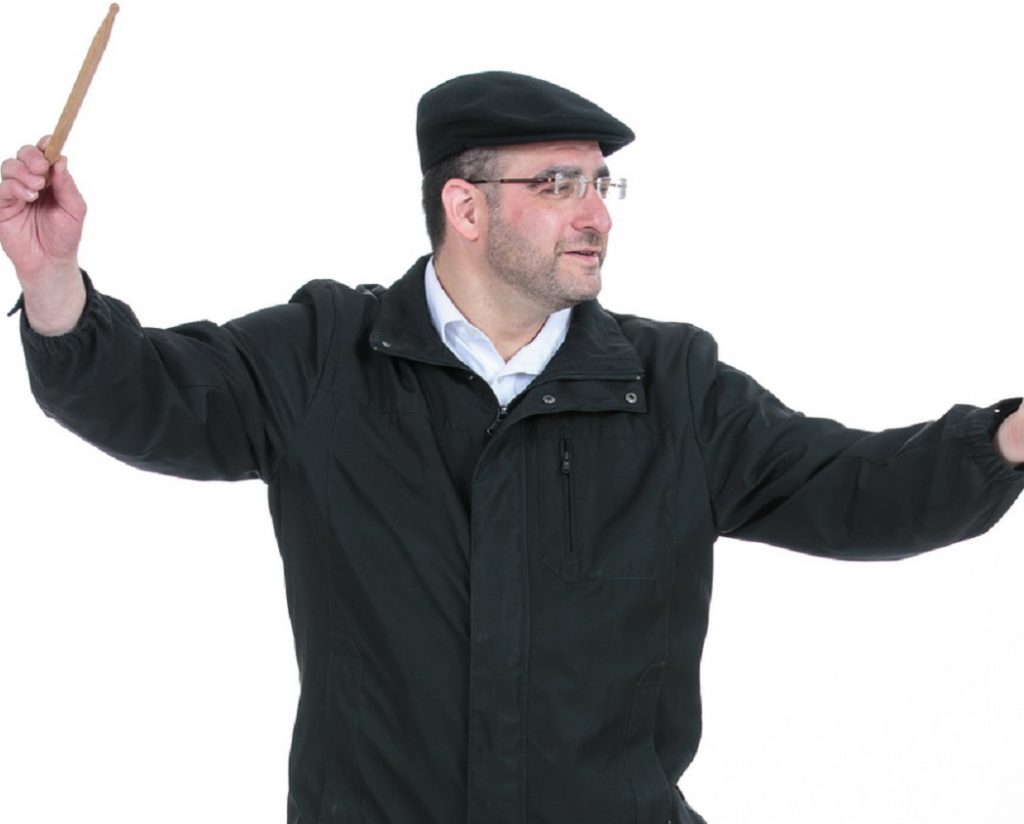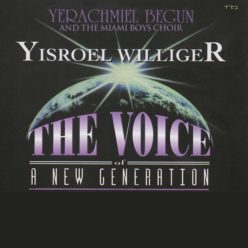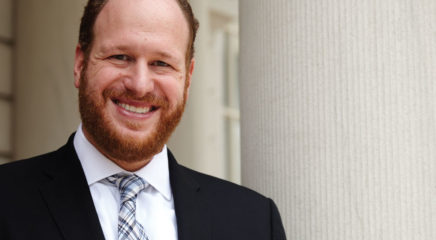C OMPOSER: YITZY BALD│YEARS: 1990-TODAY
SONGS: “LEGABAY” “TATTE OY TATTE” “HU KLAL GADOL” “AL HASULAM…” AND DOZENS MORE
Catching up with composer/producer/arranger Yitzy Bald is a journey through some of the most popular songs of the past 25 years. He casually mentions one popular song after another dance-floor hits alongside slow songs of faith and chizuk. One by one they’re songs that are hard not to recognize: “Digi Digi Da Dum (Legabay)”; “Hu Klal Gadol BaTorah”; “Samayach Samayach Tesamach”; “Emes Atah Hu Rishon”; “Tzaddik Be’emunaso Yichyeh”; “Ye’erav Nah”; “Vayichan Sham Yisrael”; “Tatte Oy Tatte Avinu Av Harachaman”; and “Smile Again” are just a small selection.
Bald first broke into the frum music scene in 1990 at the first Miami Experience concert. After he had composed “Pischu Li Shaarei Tzedek” and taught it to his friends in Camp Agudah the song was noticed and purchased by Yerachmiel Begun — and a new-old name 21-year-old Shloime Dachs was scheduled to sing it at the concert. Dachs was no stranger to the stage though having sung as a kid in Miami Boys Choir Tzlil V’Zemer and Amudai Shaish.
“As the orchestra began to play the new song Shloime’s microphone was accidentally turned off so no one could hear the vocal — but my friends from camp were in the audience and they spontaneously began to sing ‘Pischu Li.’ Dachs motioned to Yisroel Lamm who stopped the orchestra until a new mike was brought and they began the song again. But those few minutes of the audience singing were pretty memorable ” Bald reminisces.
For both composer Bald and singer Dachs a new journey had begun.
THE EARLY 1990S introduced a new genre of Jewish music and Bald was at the center of this boom. His songs on Yisroel Williger’s first album The Voice of a New Generation released in 1994 are a classic example. The energized “Hu Klal Gadol BaTorah ” the album’s instant hit was actually composed a year earlier when Yitzy was still a teenager learning in Torah Vodaath. After high school he learned in Eretz Yisrael for a year.
“When I came back ” he says “I had this desire to be a mechanech [Today in addition to leading the New York Boys Choir writing songs and producing albums and music videos he’s also a rebbi in the Mill Basin Yeshiva Academy]. There were so many nice yeshivah boys falling through the cracks. When I began to learn with a boy I always started with the Kitzur Shulchan Aruch opening to the first page to shivisi Hashem l’negdi tamid.”
Those words the continuation of “Hu Klal Gadol BaTorah ” became one of Bald’s most popular compositions — and he says he feel the success of its upbeat clap-along rhythm was Heavenly recompense for his patience with the young boys to whom he taught these powerful words each time they began to learn.
As a child Yitzy Bald spent summers at Camp Agudah and had the opportunity to meet legendary Agudah leader Rabbi Moshe Sherer with whom surprisingly he formed a bond through song. “When Rabbi Sherer came to camp I played the welcome song for him and I subsequently got to know him through his grandson through my years as a counselor at camp and through my attendance at the Agudah conventions. In 1996 Rabbi Sherer was notably absent — he’d already fallen ill with leukemia. But in 1997 he was in remission and was back speaking at the convention. On Friday night he asked me and a friend to sit and sing at his table. He told us to sing ‘Tatte ’ and so we sang the ‘Tatte Tatte’ from Dveykus. Afterward Rabbi Sherer explained that he actually meant my own composition ‘Tatte Oy Tatte Avinu Av Harachaman ’ sung by Srully Williger. As we reached the refrain this master of self-control began to cry.”
Reb Shimshon Sherer Rabbi Sherer’s son later told Yitzy that his song was an absolute favorite of his father. “He told me it got him through the year of his illness and treatments.”
When Yitzy’s own mother was niftar that same year after a two-year battle with cancer Rabbi Sherer expressed his gratitude for the song by coming to be menachem avel Yitzy and making several phone calls to the fresh yasom. When Yitzy attended the 1997 Siyum HaShas that September in Madison Square Garden together with his father Srully Williger was called to the podium and began to sing “Tatte Oy Tatte ” just before Rabbi Sherer — already weakened but still so strong — got up to speak.
“I knew that Rabbi Sherer had arranged to pay me back with that song ” Yitzy says.
In 1998 Rabbi Sherer passed away — and Reb Shimshon told Yitzy that the song accompanied his yetzias haneshamah.
THE CONNECTION to Rabbi Sherer remains dear to Yitzy Bald and Camp Agudah is still a part of his life. Music and chinuch go hand in hand as he spends each summer as a learning rebbi and naturally takes charge (who else?) of the camp’s production at the end of the season.
Most of Bald’s hits were composed surprisingly quickly but he remembers that for “Sameach ” the title song on Mendy Wald’s album Sameach! back in 1996 he had the high part ready and waiting for five years before the low section of the song came to him. “I davened a lot for that one and Hashem eventually sent me the inspiration.”
In contrasting style but also sung by Mendy Wald on his second album L’Chaim (which was also composed and arranged by Yitzy Bald) the song “Smile Again — Refaenu Hashem” touched the hearts of listeners with an emotional appeal to the Heavens for the sick to be cured. With the help of his buddy Dr. Yechiel Zagelbaum Yitzy added English lyrics to the prayer which he set in a soaring melody of hope: “Wipe away the tears of sorrow pain and fear/ And even when His master plan is sometimes hard to understand/ To the Heavens above our prayers will ascend/ In the blink of an eye all our suffering will end…”
He might have been young when he wrote the song but the emotion was genuine. “I wrote it for my mother but then it ended up becoming a prayer for so many families struck by illness.”
MBD’s famous “Emes Atah Hu Rishon” also started as a song of healing. About 18 years ago Bald and his keyboard accompanied Mordechai Ben David to sing for a very sick ten-year-old boy and while performing Mordechai mentioned that he would be traveling to Israel that night to record his next album We Are One but he was missing a geshmake niggun. On the spot Yitzy played a song that he had just composed and they started to sing it in front of this boy. MBD loved the song so much that he took out a cheap recorder and when he played back “Emes” for Mona Rosenblum at the Israeli studio the next day the enthusiastic producer/arranger immediately notated the entire song on tissue paper so the orchestra could follow along. That song became an instant hit — and it had all started the day before with the mitzvah of being mesameiach a sick child.
ONE EVENING at the end of a grueling day Yitzy Bald was playing keyboard at a vort. As the simchah wound down he was thinking of singer Dovid Gabay who was looking for songs for his debut album. The tune of “Digi Digi Da Dum” came to mind and Bald began to play it.
Just then Rabbi Yaakov Salomon a guest walked in and came over. “I never heard this music before what is it?” he asked and Bald said he’d just made it up. Together they committed the tune to memory until Yitzy was able to record it. Rabbi Salomon then located ten different Gemaras that use the word “l’gabbei.”
“I loved the one about the Kohein Gadol — ‘regarding (l’gabbei) the service of the day he is zealous.’ I thought about how every Jew needs to stay eager and conscientious in his daily avodah.” The album was entitled Legabay and although Bald wrote most of the album’s other songs too this one became Dovid Gabay’s signature hit.
Since 2008 Yitzy Bald has been pouring most of his musical energies into his New York Boys Choir. As an idealistic yeshivah rebbi his choir is part of the extracurricular framework he sees as so important for boys of today.
“Yes we do perform but it’s not really about concerts ” he explains. “It’s about the whole experience of spending time on music of getting together for enjoyable extracurricular time in an meaningful endeavor.”
That’s what the song “Al Hasulam” from the choir’s first album is all about. One Shavuos he saw a quote from the Piaseczno Rebbe in Mishpacha’s Shavuos magazine: “A man has to build a ladder up to Shamayim and one of those ladders is the ladder of song.”
He loved the quote and that night he dreamed of an inspirational song with lyrics based on the concept. “I woke up and I tried to hold onto the tune. Second day Shavuos is a long day but I kept humming it because I couldn’t record. On Motzaei Yom Tov I sat down to work on it and by 4 a.m. I had the song complete.” It’s a high-energy tune with Hebrew and English words: “Shiru shir laShamayim al hasulam shel shirah — sing a song laShamayim ladders of song… wo-oh-wo-oh…”
Yitzy Bald for one is moving up the rungs. (Originally featured in Mishpacha Issue 662)




